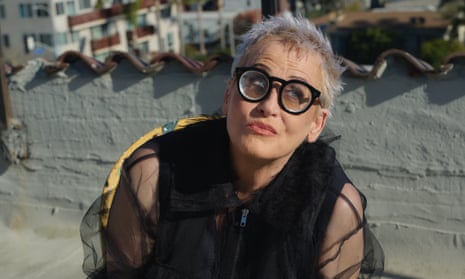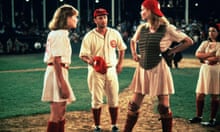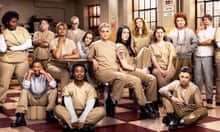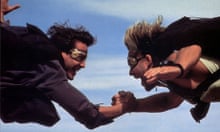Lori Petty lives with her cat in a gloriously cluttered apartment in Venice Beach, a neighbourhood in southern California that she moved to three decades ago while filming the surfer movie Point Break. A row of high arched windows let in plenty of light, and just about every other spare inch of the 58-year-old’s wall space is given over to portraits, photographs, hung up hats and books. Somehow, Petty has found a patch of bare whiteness that’s big enough for her to sit in front of for our Zoom call. This took a bit of stagecraft, she admits. “Ya ready?” Petty whips away the white background to reveal the reflective glare of an LCD screen. “It’s my TV! I put a quilt over it!”
She has a gleeful, infectious cackle; she has close cropped grey hair, occasionally dyed platinum or purple, and conspicuous sleeve tats. But it’s Petty’s unique way of talking that catches your attention at the outset. Both squeaky and hoarse, part Smoky Mountain preacher, part chill Cali baller, her voice puts you in mind of all the eclectic screen work past and present, whether that’s the family film A League of Their Own (1992) or the gen X classic Tank Girl (1995), the Netflix series Orange Is the New Black (2013-2019) or her superb new TV show that debuted this winter on HBO and (in the UK) Starzplay: the apocalypse drama Station Eleven. About 18 months ago, while enduring “the severe, crippling loneliness” of someone who lived alone through the pandemic, Petty auditioned for Station Eleven just like this: squatting in front of her telly, quilt as backdrop, lighting courtesy of the Pacific sun.
Based on an acclaimed 2014 novel by Emily St John Mandel, Station Eleven tells the story of a group of survivors living around Lake Michigan in the months and years after a flu-like pandemic has killed all but one in 1,000 of the world’s population. The show was in production (and partially filmed) before Covid struck. Everybody who worked on it through 2020 and 2021 had to contend with the eerie feeling of art and life being utterly blurred. Petty filmed her scenes in Canada, “where we were in lockdown my entire 140 days in the country. There was no furniture in the hotel lobby. There were no restaurants. There were no bars.” She folds her tattooed arms and adds, with a grin: “Y’know what? In my experience? When you go on location to shoot? You have a good time. You have sex. Not on this one! This was not hanging out with the crew. This was not buying cute shit in the nearest city. This was staying in your bubble. There was literally a plastic bubble inside the car that took you between the hotel and the set.”
I don’t think I’m alone in finding Station Eleven (its penultimate episode launches on Starzplay today) the smartest, most relevant TV show of the decade so far. It doesn’t only grapple with questions of how to carry on when times are hard. Instead it asks, why carry on at all? Station Eleven’s show-runner, Patrick Somerville, drawing from Mandel’s bestseller, introduces us to a made-over America populated by scavengers and terrifying nihilists, but also by actors, musicians, museum curators, horticulturalists, gourmands. We meet a community of pregnant ravers who care for each other in an abandoned furniture shop. We meet an eccentric, shaven-headed musician called Sarah, played by Petty, who endlessly composes impossibly ambitious symphonies on a salvaged piano.
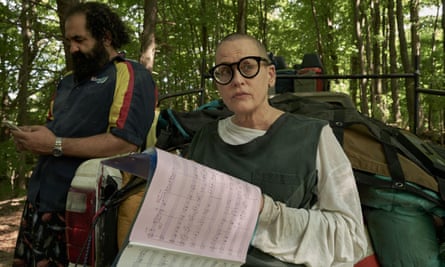
“Those piano lessons!” says Petty, remembering a gruelling schedule of Zoom-based lessons that she undertook from quarantine. “Can you imagine? I had my computer on a laundry basket. I had my electronic keyboard on my lap. I had a nice man called Gregory who kept asking to see what I was doing with my hands.” For one scene it was scripted that Petty would play a piano solo, at night, outdoors. “Two in the morning and it starts pouring with rain. I was, like, ‘We’re gonna shoot this. I am not gonna have been sitting in that room doing 140 days of piano lessons not to shoot this!’ And I played the Jesus out of that song.”
I’m only a few minutes into my conversation with Petty and already it’s clear why she and this particular show have gelled so well. Station Eleven insists on the primacy of art, of humour, of joy – however shitty things get. Petty’s fascinating life has been faced in much the same way. “We choose how we react to any given day,” she says. “I might wake up, I’m gonna take a walk on the beach, I’m gonna be happy. Or I’m gonna stay in bed and read a book and feel sorry for myself. You make these choices!” In Station Eleven, she says, “life has given these people mouldy lemons. They choose to go forward anyway. They choose life.”
Petty got a few mouldy lemons herself at the start. “Oh yeah,” she says, “I had a colourful background.” Her first years were spent in a trailer park in Tennessee. By the time she was a teenager she lived with her single mother, Mary, and two younger sisters in desperate-sounding conditions in Illinois. Decades later she dramatised this period of her life in a film she co-wrote called The Poker House. Abusive father. Mother, addicted to alcohol and drugs, who was coerced by a new partner into prostitution. Pimps in the house. Petty’s black-as-ink sense of humour must run in her family, though, because when she showed her mother a final cut of the film, Mary complained: “But I never smoked in front of you!”
The Petty women are still very close. In fact, Mary calls during our interview, right as Petty is talking about how she used to withdraw from the chaos at home and hide out on a local basketball court. They talk about a sore tooth that Petty has been visiting dentists about. They say they love each other several times and when Petty hangs up she shrugs: “You always have to answer when your mom calls, right?” How did she get through those difficult early years and retain a relationship, I ask, and she quotes the movie Fight Club. “You are not your fucking khakis.” I don’t quite understand this, until Petty explains: “You are not what happens to you.”
She was still a teenager, she recalls, when she climbed on a bus “and moved to New York. I lived at the YMCA. I don’t remember being afraid.” She got her first headshot (denim jacket, cropped dark hair) and while still technically homeless she auditioned for TV shows. Small roles on Twilight Zone, The Equalizer and Miami Vice followed in the mid-1980s. She tells me a story about her breakthrough job on a 1989 TV show called Booker, “a very silly show that was a spin-off of 21 Jump Street”. Its male stars were Richard Grieco and Johnny Depp. “Both were huge deals at the time. Like the Beatles, mobs of girls chasing them down the street.”
Petty was 21. She remembers it dawning on her that celebrity behaviour seemed to invite celebrity trouble. This epiphany informed the early years of a movie career that followed. “I was never gonna be the movie star in a room who’s the last one out to set. I was never the one saying, ‘I won’t wear red cos she’s wearing red.’ I’m not that person. Others treat you how you behave. We each set our own tone.” She remembers early movies for the giggles that were generated on set, for the silliness and the luxuries behind the scenes, for “the limos… the penthouse suites with columns inside them – real columns! – the billowing curtains”.
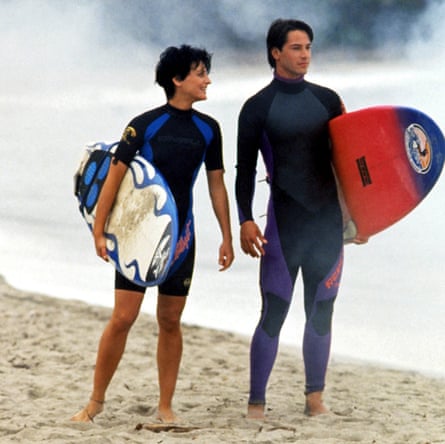
Slathered in fake tan to play a surfer in 1991’s Point Break, Petty was in the middle of a screen kiss with Keanu Reeves when she hooked her fingers in her co-star’s belt, trying to catch Reeves off guard by prolonging the snog. (She did – you can see his astonishment in the final cut of Kathryn Bigelow’s movie.) A year later she was shooting Penny Marshall’s baseball movie A League of Their Own, holding her own in an ensemble of stars including Tom Hanks and Madonna. Petty shared a makeup trailer with Madge. Curious, one day, she asked: “Did you always know you were gonna be Madonna?” To which Madonna replied no. But she did pray to be.
Petty’s own prospects were not as clearly mapped out. When she made Free Willy in 1993, another cheerful family film, another hit, she figured she was carving out a niche for herself. “Y’know, cool, this is my job now.” Almost as soon as that thought had struck, work dried up for months. “It was just, like, blam,” she says, slamming her hands down on the table in front of her. It’s not quite clear what changed, but Petty has always credited the employment dip to the fact that she didn’t have the right appearance for the era: too pale, too androgynous, not a Rachel from Friends, not a Winona. “I always used to tell [casting directors], ‘If you want the girl next door, go next door, that’s where she lives, cos I’m not her.’ So it’s kind of my fault.”
When the lead pulled out of Rachel Talalay’s 1995 adaptation of the comic book Tank Girl, Petty was offered the role. This high-profile movie lost a lot of money on its cinematic release, though became a cult hit on home video and DVD. It continues to inspire generations of cosplayers and to this day Petty earns pocket money from appearances at comic conventions. On the occasion of Tank Girl’s 25th anniversary, during the 2020 pandemic, Petty and her director reunited for a tweet-a-long viewing of the movie. Career-wise, those 25 years had been seriously mixed ones for Petty.
At the turn of the millennium there were guest spots on Star Trek and ER. She had a profitable run voicing a baddie in Superman cartoons. By 2005, she was way down the credits in a movie called The Karate Dog. Shortly afterwards, her ex-partner, the actor and comic David Alan Grier, suggested they write a screenplay together. This led to The Poker House, which Petty decided told a story so close to home she should direct it herself – the project wasn’t only influenced by her childhood, but also by her experiences as a woman in showbusiness.
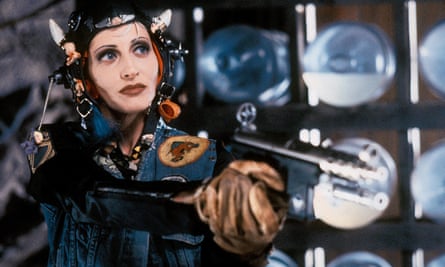
Petty explains. She came up in an especially bad time for actresses, when screen representation for women was at a low ebb and when the average studio flick (at least by her own anecdotal calculations) might feature 60 actors, of whom three or four would be female. “The lead girl, her friend, the mean boss, and that [was] about it.” Things were way worse behind the scenes. As a young woman she showed up at an audition, already instructed to wear a certain type of dress, only to “have to walk around a table of men”. She can see things have improved a little now. She feels qualified relief. “Look, man, do I want the world for young actresses now, do I want the moon and the stars for them? Yes. And I want them not to be sexually harassed… I want them not to go through bullshit.”
As a director, Petty would gather in her crew for pep talks. “I’d say, ‘Good morning everyone! Remember, there’s no smoking on set. No yelling. Oh. Also? No one touches my actors except hair and makeup and costume. No one. Ever. Thank you.’ Every day I said that, every day.”
The Poker House starred Jennifer Lawrence, then a teenager, in one of her first movie roles. Petty had trailer-buddied with Madonna, she’d snog-teased Keanu and as soon as she saw Lawrence’s audition tape, she smelled a coming star. “Great actress, astonishing to look at – and I’m only talking about her looks because I noticed that she was just gravitational, on set. I would say [to men on the crew], ‘Why are you touching her? Moving the hair out of her face? Then call hair and makeup!’ It was just this energy that a 16-year-old girl who’s super-gifted has. You have this energy and people want it. I know! I do these comic conventions. I don’t get paid $50 for people to take a picture. I get it so they can touch me. That’s what the $50 is for. It’s not sexual, it’s just: I-want-it-I-want-it.”
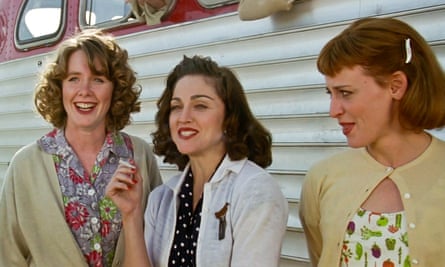
A decade before #MeToo and its cautious reforms, Petty tried to give Lawrence some advice from the perspective of someone who’d once been a rising actress herself. “I told Jennifer, ‘Listen, if you have downtime, take a walk with one of the female assistants. Read a book. Watch a movie. Take a nap.’ Then one day I saw her sitting under a tree with a grip who was 25. I said: ‘Hey babe, what ya doin’?’ She goes: ‘The wrong thing!’ I said: ‘No, no, no, you’re not doing doing the wrong thing. You could just make a better choice. What’s a better choice?’ And she goes: ‘Take a walk, read a book, take a nap…?’”
Petty snorts with laughter recalling this. Clearly she and the young Lawrence shared a similar sideways humour. When Petty finishes the anecdote it’s with more solemnity though. “So, anyway, I told the 25-year-old grip to get lost,” Petty recalls, “then I said to Jennifer, ‘My love. You are carrying this movie on your back. Everybody wants your magic. [But] you only have a certain amount of it and you need to hold it in your heart so you can give it on screen. Then it lives for ever. These dumb boys? They’re gonna try to take as much of that magic as they can. It’s not their fault. You radiate love and joy and art. But you have to protect it. You have to protect it.’”
A strange third chapter in Petty’s career, after years in the wilderness, began in the mid-2010s. She was bored and she happened to watch an episode of Orange Is the New Black on her phone. A comedy-drama about women who’d taken hard knocks, who weren’t neat and conventional in their appearance, who could be silly and serious all at once? Petty dug around on the internet, found the number of the casting director, and called up to ask why on earth she wasn’t a part of this thing.
One nice aspect of being a half-forgotten actor who people sometimes wonder about (Hey, whatever happened to Lori Petty?) is that people in Hollywood might return your call out of plain curiosity. “They wanna find out what the fuck Lori wants,” as Petty puts it. Next thing she knew, she was indeed a part of Orange…, filming several seasons as a conspiracy theorist called Lolly. Her prospects improved, though by 2019 she was still in a position to comment that she had never yet been hired for a role of note by a white American male.
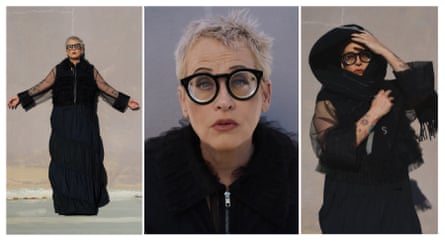
This changed in the pandemic, when Patrick Somerville met Petty over Zoom to talk about Station Eleven. As soon as she read Somerville’s scripts, which dealt with the ways that art can help people find stability in dire times, Petty was put in mind of lessons from her own youth, that however bad things get there can still be “light, love, magic, creation. Those things don’t go away, just because your circumstances are shit.”
So here she is, in 2022, a Hollywood survivor, one of the stars of an era-defining TV show, back near penthouse height in a relentlessly up-and-down career. Petty can’t account for the uncertainty of it all. “I don’t think I deserve it. And I don’t think I don’t deserve it. I just think, it is.”
Her phone rings again, probably her mum, calling back about the tooth. Before we finish the interview, Petty repeats some wisdom she’s found useful in this uneven existence of hers. “They say worrying is paying money on a debt you don’t owe. [I try to think] when is rent due? OK. And how much money do I need to pay it? OK.” she says. “And that’s about as far as I go.”
